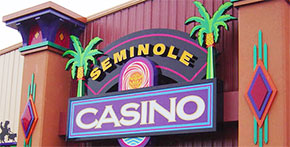House, Senate Begin Trying To Reach Gambling Deal
April 18, 2017
House and Senate leaders met briefly Monday afternoon to lay the groundwork for negotiations on the two chambers’ vastly different approaches to gambling policy.
Sen. Bill Galvano, a Bradenton Republican who will chair the conference committee on gambling, said the panel won’t meet again before Thursday but could work over the weekend hashing out differences between the plans. Lawmakers are trying to reach consensus on a new deal with the Seminole Tribe after a portion of an agreement with the tribe expired in 2015.
 That component of the 20-year deal gave the tribe “exclusive” rights to operate banked card games, such as blackjack, at most of its casinos. The tribe sued the state over the games, and a federal judge gave the Seminoles permission to continue to conduct the games.
That component of the 20-year deal gave the tribe “exclusive” rights to operate banked card games, such as blackjack, at most of its casinos. The tribe sued the state over the games, and a federal judge gave the Seminoles permission to continue to conduct the games.
The House is backing what is essentially a status quo proposal that would give the Seminoles permission to operate the banked card games, such as blackjack, for another 20 years. The Senate, in contrast, has endorsed a pari-mutuel friendly plan that would allow slot machines at pari-mutuels in the eight counties — Brevard, Duval, Gadsden, Hamilton, Lee, Palm Beach, St. Lucie and Washington — where voters have approved them.
Which pari-mutuels get slots — and where — is one of the biggest sticking points for the negotiators, according to Galvano and Rep. Jose Felix Diaz, a Miami Republican who is vice-chair of the gambling conference committee.
“Obviously, there are members from each of those communities that are looking out to make sure that one county doesn’t get new slots and their county is left out,” Diaz told reporters after the meeting.
Another point of contention involves controversial “designated player” card games operated by a number of pari-mutuel cardrooms, which are at the heart of the state’s legal dispute with the tribe.
The Senate plan would legalize the card games, while the House proposal would ban them. The tribe, which is seeking to add craps and roulette at its casinos, has maintained that the House measure — which would require a minimum guarantee from the tribe of $3 billion over seven years — would not get the requisite approval from federal authorities.
“We’re going to have to figure out what’s more important, (not) giving them those new games or getting more money for the state, because you might not be able to do both,” Diaz said. Lawmakers, who for years have been unable to reach consensus on broad gambling legislation, could be more motivated this year by a series of court decisions that could jeopardize the nearly $120 million in annual payments paid to the state by the Seminoles.
“Given what has occurred over the last several years, but especially recently with the judicial branch and the decisions that are coming out and the complexity and the ambiguity of the issues that we’re dealing with, inaction is not an option. We have to act,” Galvano said.
by The News Service of Florida



Comments